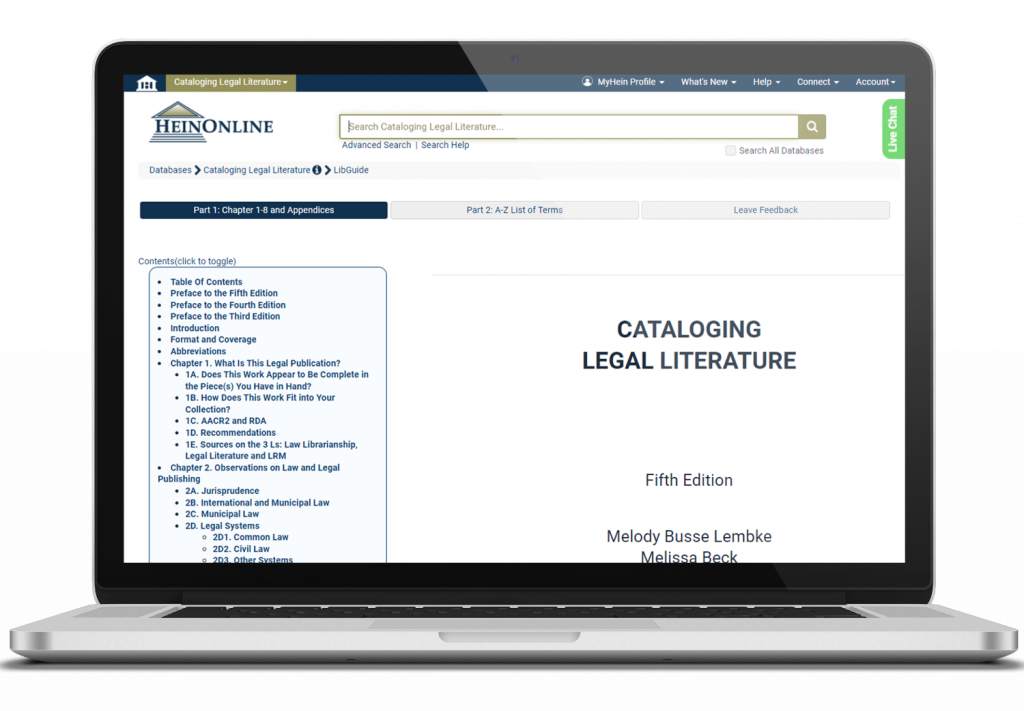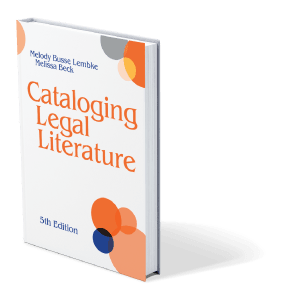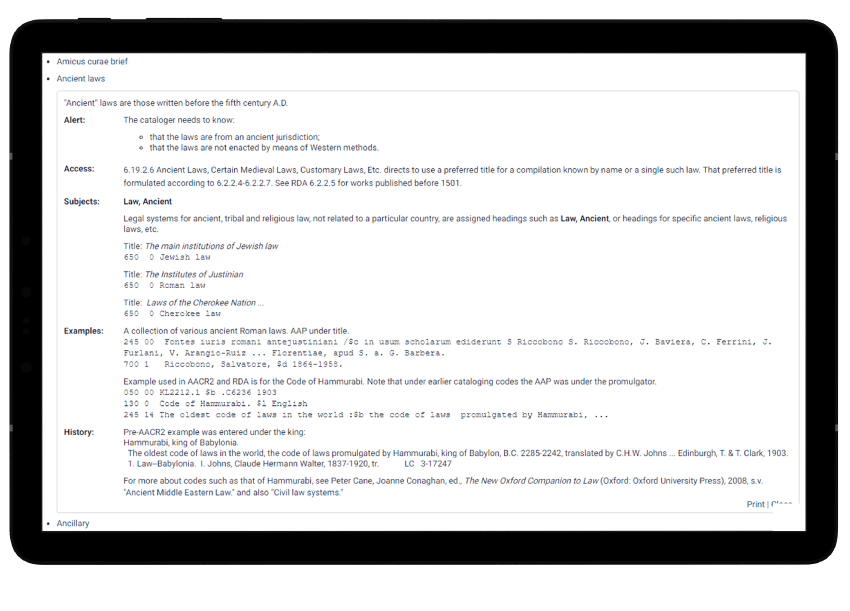WINNER OF THE 2021 JOSEPH L. ANDREWS LEGAL LITERATURE AWARD

Cataloging Legal Literature
Access the newly-revised 5th edition of Cataloging Legal Literature, an essential legal cataloging manual for any law cataloging department.

About Cataloging Legal Literature
Cataloging Legal Literature, Fifth Edition (CLL5) describes the authors’ understanding of the current descriptive and subject cataloging practices for legal materials. It addresses the needs of large and small law libraries alike, particularly those who wish to follow national cataloging standards, including the Library of Congress and the Program for Cooperative Cataloging. CLL5 addresses RDA instructions and terminology as found in both the current RDA Toolkit and its Beta Site.
CLL5 is not a general self‑help book for the beginning cataloger. One goal is to help the law cataloger deal with the ambiguities of 21st century cataloging. The questions, some unanswered, posed here are to help a cataloger analyze materials and think like a law cataloger (just like a first-year law student has to learn to think like a lawyer). The authors’ intent is to supplement existing primary and secondary cataloging sources by discussing and examining cataloging practices for legal materials.
Throughout the manual, illustrations of descriptive or subject cataloging and MARC tags are offered. Examples of subject cataloging are based on guidelines published in the Library of Congress’ Subject Cataloging Manual (SCM), as well as identifying Library of Congress practices for assigning subject headings.
CLL5 must be used in conjunction with RDA, LCSH, SHM, and general handbooks on descriptive and subject cataloging. This manual does not provide a full discussion on all of the RDA instructions or Library of Congress subject headings; only those that represent common problems for legal materials have been included. While much attention is paid to standards, flexible thinking about the needs of the law user is also one of the authors’ goals.
About the Fifth Edition
 Because the text of the redesigned Toolkit is considered “stable,” CLL5 is a major revision that incorporates the relevant concepts and terms introduced by the 3R Project. There are specific introductory sections in several chapters that address RDA3R, and whenever possible, the authors discuss new terminology in the context of the old. Most of the cataloging examples, especially for ongoing (diachronic) works, have been updated or replaced. MARC tagging is still used in these examples as the authors anticipate it will remain for some time.
Because the text of the redesigned Toolkit is considered “stable,” CLL5 is a major revision that incorporates the relevant concepts and terms introduced by the 3R Project. There are specific introductory sections in several chapters that address RDA3R, and whenever possible, the authors discuss new terminology in the context of the old. Most of the cataloging examples, especially for ongoing (diachronic) works, have been updated or replaced. MARC tagging is still used in these examples as the authors anticipate it will remain for some time.
The authors decided to retain the specific RDA instruction numbers in the current text for historical purposes, and also because they will still be relevant for some time. Hyperlinks in the online version will gradually be replaced with citation numbers to the RDA Beta Toolkit.
With a few exceptions (all noted in CLL5 when applicable), the practical approaches for the cataloging of legal literature as described in this work have remained the same, despite changes in the RDA Toolkit.
For the purposes of this edition, the authors have incorporated as relevant:
- RDA through April 2017 (the date the Toolkit was frozen)
- RDA as realized in the Toolkit Beta Site through July 2019
- Official documents and presentations from the RDA Steering Committee and its official representatives through July 2019
- Discussions and decisions (if any) from cataloging meetings and roundtables at the recent AALL Annual Meeting in July 2019
In addition to covering the development of RDA, CLL5 also includes the topics covered in Technical Services Law Librarian through Volume 44, no. 4 (June 2019), and relevant LC and PCC documentation through July 2019.
About the Cataloging Legal Literature Database
Part 1
In addition to print, CLL5 is available in digital format as a searchable resource in HeinOnline. The chapters within Part 1 include hyperlinks to cataloging resources, extensive MARC examples, and charts:
- Chapter 1: What Is This Legal Publication?
- Chapter 2: Observations on Law and Legal Publishing
- Chapter 3: Continuing Resources
- Chapter 4: Electronic Resources (E-Resources)
- Chapter 5: Titles and More Titles
- Chapter 6: Editions of Legal Works
- Chapter 7: Subject Cataloging and Term Application
- Chapter 8: Classification of Legal Materials
- Appendices
When available, referenced resources (the RDA Toolkit, CONSER Cataloging Manual, etc.) are linked within the text of the document.
Part 2
CLL5 contains an alphabetical listing of more than 220 legal terms and publication formats. These terms will link users to RDA instructions, subject practice, classification information, and cataloging examples.
Browse terms such as actions, appeal proceedings, bar journals, citations, foreign relations, indexes, journals, law reviews, opinions, session laws, trademarks, and more! You can also search the fields of text, term, definition, alerts, description, subjects, classification, and history.
Simply click on a term to view its RDA provisions, classification tips, MARC examples, and more.

A Note About Digital Updates
Given the nature of the current cataloging climate, especially as members of the field await the official restructured RDA Toolkit, the authors and HeinOnline have enhanced the publication format to allow for frequent and timely updates. For this new edition, Hein developers have made it possible for the authors to directly edit CLL5 online, and these updates can appear almost immediately in the public interface. While there is also a print version available, users of CLL5 should check regular release notes in the online version to stay aware of new and revised content, particularly in regard to RDA and the revised RDA Toolkit.
The RDA Toolkit Restructure and Redesign Project
In April 2017, additions and change proposals to the current RDA Toolkit from constituents such as the AALL cataloging community were placed on moratorium. This also included any policy statements from the Library of Congress and the Program for Cooperative Cataloging (PCC). The current version of the RDA Toolkit was frozen (permanently) in favor of the RDA Toolkit Restructure and Redesign (3R) Project, the goals of which include aligning RDA with the IFLA Library Reference Model (LRM).
Details of the Project to Date:
As of the publication of this edition, catalogers are still poised between the RDA Toolkit as it now stands and RDA3R, a new interface that includes new concepts, redefined terminology, and a number of options for describing a bibliographic resource. As of the date of this edition’s publication, these are the details known so far:
- A stable baseline text for working on translations and policy statements currently exists. Any additional changes made during this phase should not affect the outcome of the instructions and their application.
- Multiple options for any given instruction allows for multiple choices in creating a bibliographic description, to be determined by specific application profiles. Application profiles are expected to come from interested cataloging communities.
- Most of the actual cataloging instructions are similar to previous ones. The wording has changed, but the outcomes are essentially the same due to a commitment by the RDA Steering Committee to rebuilt the Toolkit with minimal impact on current practice wherever possible.
- The redesigned Toolkit will launch what is being referred to by RDA developers as an “orientation phase,” consisting of a series of webinars, online courses, and demonstrations. Some of these may have already taken place by the publication of CLL5, and wherever they have been quoted, they are referenced in endnotes and listed as useful sources.
- Once the RDA Steering Committee and RDA Board approve the current beta site, then the one-year countdown will begin for retiring the current Toolkit. When pressed for a timeframe, representatives admit that the projected countdown date has shifted from late 2019 to early 2020. This means that the current RDA Toolkit will probably still be in effect into at least early 2021.
About the Joseph L. Andrews Legal Literature Award
Cataloging Legal Literature, 5th Edition has been named the winner of the 2021 Joseph L. Andrews Legal Literature Award. This award recognizes a significant textual contribution to legal literature. The textual work may be a book, pamphlet, periodical contribution, website, database, or publication in some other format. Nominations for the Andrews Award shall be measured by the creative, evaluative elements and the extent to which originality and judgment were factors in the formation of the work. The term ‘legal literature’ is meant to be broadly defined, and includes works that: 1) are bibliographical in nature, listing the works of a particular author, printer, or country, or a particular theme; or 2) contribute to the body of legal literature and that also contribute to advancing legal research or law librarianship.
About the Authors

Melody Lembke is the recipient of the 2020 Marian Gould Gallagher Distinguished Service Award.
Melody retired as the Associate Director, Collection Services at University of California, Irvine Law Library. Since the school began in 2009, she helped build a largely electronic Law Library collection while keeping current on RDA. Melody is a co-author of all five editions of CLL, as well as the former compiler for Supplement to Subject Headings for the Literature of Law and International Law, and Index to LC K Schedules. She admits to being an AALL member for over 40 years.
Hear from Melody Lembke herself about law librarianship, Cataloging Legal Literature, and more in HeinOnline’s Oral History of Law Librarianship series.

Melissa Beck is the Head of Cataloging at the UCLA Law Library. She is a long-time member of the Program for Cooperative Cataloging (PCC), and has developed cataloging manuals, training materials, and workshops for serials, integrating resources, and electronic resources. She admits to never having cataloged a treaty.
